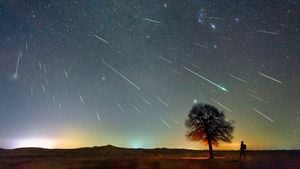Donald Trump has officially nominated Brooke Rollins to serve as the secretary of agriculture, finalizing his cabinet selection. The announcement came late Saturday afternoon, positioning Rollins, who leads the America First Policy Institute, as the latest addition to the President-elect's team. Trump stated, "Brooke will spearhead the effort to protect American Farmers, who are truly the backbone of our country," emphasizing the importance of agriculture to the nation's economy.
Rollins is not new to the political arena; she has been one of Trump's most prominent allies for years. Previously, she co-founded and led the America First Policy Institute, known for its support of Trump's policies and agendas. A former aide during Trump's first administration, she held key roles including director of the Office of American Innovation and acting director of the Domestic Policy Council.
Raised on a farm, Rollins' connection to agriculture runs deep. Her early involvement with organizations like Future Farmers of America and 4-H laid the groundwork for her passion for farming and rural communities. After earning her Bachelor of Science degree in agricultural development from Texas A&M University, she practiced law before stepping onto the political stage.
If confirmed, Rollins will oversee various programs under the Department of Agriculture (USDA), including farm subsidies, federal nutrition programs, and meat inspections. The USDA, established by President Abraham Lincoln in 1862, manages issues ranging from food quality and safety to animal health and welfare. It plays a pivotal role in shaping policies affecting America's $1.5 trillion food and agriculture industry.
Rollins' nomination marks the conclusion of Trump's cabinet selections, which have often sparked controversy and intrigue during this transition period. Her appointment has broad significance—beyond overseeing agricultural policy, she'll be pivotal to the negotiations surrounding international trade agreements, including ones with Canada and Mexico.
Trump's transition team had been under intense scrutiny for weeks, as the agriculture secretary position became one of the last major roles to fill. There was substantial speculation over who would take on this significant role, with names like former Georgia Senator Kelly Loeffler also being floated. The dynamics within Trump's inner circle, including family members and key advisers, led to considerable jockeying over the final nominations.
Given Trump’s history with agricultural policies, Rollins will have to navigate complex waters. During Trump's previous term, farmers experienced the impact of trade wars, particularly with China, where retaliatory tariffs severely affected U.S. exports of corn and soybeans. The agriculture sector is increasingly wary about fresh tariffs, and Rollins will need to balance Trump's economic strategies with the needs of farmers.
Southern agriculture organizations are likely to welcome Rollins' appointment due to her Texas roots. While GOP lawmakers expressed surprise over the choice, they anticipate a relatively smooth confirmation process, thanks to her established connections and the backing of several key agricultural interest groups.
On social media, Rollins expressed her honor at potentially serving farmers, stating, "It will be the honor of my life to fight for America’s farmers and our nation’s agricultural communities." There’s no doubt Rollins has her work cut out for her, as she will need to collaborate with various stakeholders to address farmer concerns and implement effective policies.
Another significant area under Rollins' purview will be the Supplemental Nutrition Assistance Program (SNAP), which provides assistance to millions of low-income Americans. Anticipation is high around how Rollins will approach potential reforms, especially with legislative efforts aimed at curbing spending on food assistance programs as part of the broader fiscal strategies expected from the new administration.
While Rollins has garnered support, she remains somewhat of a wildcard. Conservative agriculture groups hope she will bring the experience necessary to counterbalance more radical overhauls pushed by figures like Robert F. Kennedy Jr., who is poised to take charge of the Department of Health and Human Services, advocating for considerable changes to American food systems.
While the exact policies Rollins will champion remain to be seen, Trump has indicated she will align the USDA closer to his vision for America's food independence and agricultural strength. The ultimate test will be balancing traditional agricultural policies with the need for innovation to protect and advance the agricultural sector.
With the agricultural sector’s future intertwined with policies set forth by the USDA, all eyes will be on Rollins as she prepares to navigate the complex agricultural and food policy landscapes. How she tackles these issues will resonate with farmers across the country and impact America’s food security moving forward.



